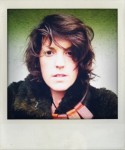
Me: When did you first become interested in photography?
Abbie: I first became interested in photography aged 13 or 14 when I got my own SLR camera and began trying to understand the bewildering world of apertures. My parents had both been to art school and had all the darkroom kit so I began developing my own films and have been into photography ever since. Although I now get films processed at the lab.
Me: What was your first camera?
Abbie: A pentax (can’t remember which one) which broke a few weeks after me first using it.
Me: Do you prefer film or digital?
Abbie: I love both. Digital is fantastic because of the freedom it gives you and the opportunites to learn so much faster but film has a special quality and I love the way the nature of it slows down the process and hence why I use it for my personal work – A mamiya 7.
Me: What photographers have you been or are influenced by throughout you career?
Abbie: All the classics, Nan Goldin, Diane Arbus, Winogrand, Phillip Jones Griffiths, Sally Mann, Taryn Simon, Christopher Morris, Chloe Dewe-Matthews, Zed Nelson.

Family 01 – Nan Goldin

Family Pictures 05 – Sally Mann
Me: What is the most inspiring thing you have documented?
Abbie: Human life is inspiring full stop. Our ability to adapt, survive, grow, change..
Me: How do you deal with situations that can be hard-hitting?
Abbie: I don’t know how to answer this really. Hard – hitting situation can’t help but affect you or otherwise you wouldn’t be human. But you deal with them as you deal with difficult situations in your own life – in whatever way you can. In my work I also see lots of positivity, hope, strength, inspiration, happiness, so it’s about seeing the whole picture as much as you can.
Me: When documenting, what do you hope to convey through your work? Maybe using an example of your piece on the ladies of Guera?
Abbie: I don’t hope to convey anything as such, just to engage the viewer to what to stop and look and want to know more. With The Ladies of Guerra, what struck me about these women who were living on the edge with no food and their country badly affected by long term drought was the power of their stare. What that conveyed to me was the strength of women in general to cope with adversity but what it conveyed to someone else I would love to know.

Katouma Moussa – Abbie Trayler-Smith (The ladies of Guerra(Panos Pictures))
Me: What do you think makes a good picture stand out from the average?
Abbie: It’s indescribable. That spark. That extra something that makes it stand out.
Me: What motivates you to do what you are doing?
Abbie: It’s just never occurred to me to do anything else. I love photography and I love making pictures.
Me: What is the job that you have done that has meant most to you as a person?
Abbie: So difficult to answer, I’ve been lucky enough to cover lots of amazing assigments and each of them has been important for different reasons: The Mothers of Yemen because it was the first time I witnessed the birth of a child, and an amazing insight into such a wildly different culture from my own. Going to Mali with the BBC for the sheer excitement of being in a sandstorm. Covering the Asian tsunami in 2004 because it was my first experience of a natural disaster and all that that entailed.

Yemen – Abbie Trayler-Smith (The Mothers of Yemen (Panos Pictures))
Me: Do you believe the expression “a picture is worth a 1000 words”, and why?
Abbie: Absolutely. Photography is more powerful then ever. It’s an international language. Now it accessible to the masses more people than ever are engaged with photographs. With the rise of the internet and popularity of apps such as instagram etc. images can be seen immediately around the world seconds within being taken. And the explosion of advertising means that we are bombarded with so many thousands of images more than we ever were.
Me: If I wanted to be a documentary photographer, how do you suggest I get myself involved?
Abbie: Just do it. Photograph what’s important to you. Do a personal project. Study great photographers and look at how they construct their work. Do work experience, assist, intern, shadow, talk to as many people as possible in the industry, get involved in the industry, use twitter, other social media. Start a blog. Make work. And if its what you really want don’t give up.